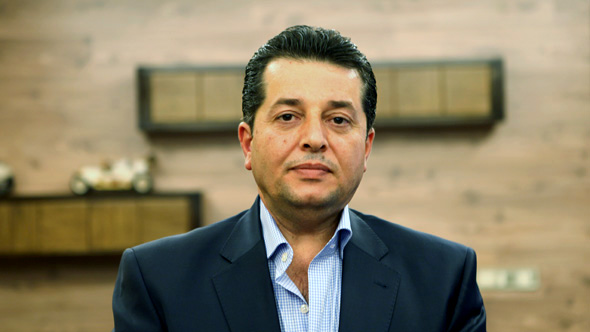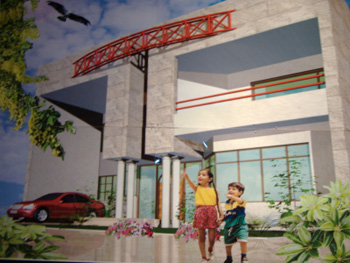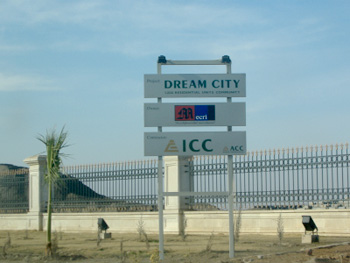Dream City Erbil: a Residential Project in Erbil
Rashid Hoshiar, CEO of Address Kurdistan / Kani Group
According to Hoshiar, the prices of real estate in the Kurdistan Region of Iraq have increased by more than 500% over the last five years. His company Address Kurdistan is currently working on a residential project known as Dream City, located in the city of Erbil.
Interview with Rashid Hoshiar, CEO of Address Kurdistan / Kani Group

How many foreign investors, how many people have a unique perception of Kurdistan and about doing business in Kurdistan? What is your own take? What is happening in Kurdistan, how easy it is to do business here and what are the opportunities?
Of course, most of all, we encourage certain specialized companies to come to Kurdistan. But the most important element are the activities of these companies; the area on which they are focused.
It was 5 years ago when some companies with very specific expertise established themselves here. They focused mostly on investment and real estate projects, real estate development.
Today, Kurdistan needs industrial projects. However, this idea of investment into industry hasn’t reached the foreign investor or sponsor yet.
Anything else you would like to add?
Of course the area needs a great amount of quality European investment. Around a year and a half or two years ago, the administration in Kurdistan started to put conditions or mechanisms in place in order to present projects to European investors. They learnt from previous experiments that anything other than quality European investments would not make the project a success.
Now that you have many activities in the real estate sector, so what is your take on the real estate in Kurdistan? There are many reports claiming the real estate in Kurdistan is overvalued, that it’s very expensive compared to California. What do you feel?
The Kurdistan region has gone through various stages. Until 2003, the region was considered to be 25 years behind its neighbouring countries. The change within the Iraqi state and government and the fall of the previous government gave an opportunity for the oil money to come in. 70% of the people in Kurdistan are involved in the real estate investment and development. The real estate development affected the prices in the area. It is important to note here that most of the investors or companies invested into projects without first studying what kind of results their investment might yield. The prices of the real estate in the region today, especially in the Kurdistan region, are comparable with neighbouring countries. Such high prices are of course going to affect in the long-term the decision-making of foreign investors.
Because in the end the foreign investor takes a risk and has a figure he must follow. Who pays for it in the end? The people of the region, and anyone who makes an investment here.
If we compare the current prices with those of only five years ago, the prices of the real estate in Kurdistan have already surpassed 500% of increase. The situation regarding rentals is the same. The main problem is that there isn’t a local industry; whatever comes into the country is socialist.
The privileges given to the foreign investor by the government cannot be found in any of the neighbouring countries. The foreign investor has the right to own 100% of a property. He has the right to establish a local company, or to open a branch without having to share locally. This privilege is also applied in the neighbouring countries. This has resulted in an incredible difference in prices.
If we compare the current prices with those of only five years ago, the prices of the real estate in Kurdistan have already surpassed 500% of increase. The situation regarding rentals is the same. The main problem is that there isn’t a local industry…
What are the growth prospects for the real estate sector?
The country still needs a lot of investment but in different areas or activities than those during the last ten years. There are some actions that Kurdistan still needs in order to evolve. But I imagine that the industrial sector is going to be the leading area of interest for the next ten years. The leading projects will be either in infrastructure development or agricultural development. Kurdistan today has fertile lands but there is no support for agricultural projects. Kurdistan has the most fertile lands our of the whole Iraq. I am sure that any development in the industrial and agricultural sectors will help the country to progress and grow.
Could you give us a brief presentation of the company itself, what are the specific sectors of activities?
Address Kurdistan was established early in 2012. Before Address Kurdistan we had a number of companies, and I mainly dealt with a group of companies called Stair. I administered projects, and the relationship between the company and foreign investors and also the relationship between foreign companies and the administration of the government of the Kurdistan Region (KRG). We established Address Kurdistan to organize the administration and relationship between the government (KRG) and the company specializing in executing strategic projects or industrial projects.
The company has two goals: firstly, organizing the relationship between the two sides and studying the project completely and getting it to the foreign investor or the foreign contractor.
Of course we have some work done by groups co-operating with us. We have done real estate projects, real estate development, buildings for the state for the administration of Erbil province or housing projects. Currently we are developing the electricity and energy sector in Kurdistan region. We are currently cooperating with a group of international companies like Echelon or Tata the Indian company, on how to organize and distribute electricity in the Kurdistan region – Kurdistan would be considered the first region to do so in Iraq. The only smart metering project in the region was done by the Dubai government. The project being done now by the KRG was already done in Europe and isn’t older than ten years.
What are some of the problems related to business activities which Kurdistan is facing on the short-term and long-term?
Of course there are problems. The problems most affecting Kurdistan are related to the politics. We have problems with organizing our relationship with the Iraqi government. There are also border problems with Turkey, with Iran. The organization of the structure of the Kurdistan administrative government is going to need an improvement. The main problem for the region, I believe, is there Kurdistan has no sea. Most the countries that control the region are our neighbours. In case of a slightest political problem, Turkey will close its borders and so will Iran. Of course, wise actions of the Kurdistan administration can help overcome these issues.
I think that the only problem facing Kurdistan is the inability to reach a final form with the Iraqi government. The Iraqi government has no clear policy towards Iraqi Kurdistan. Yet I believe that the policy and mentality of the Iraqi Kurdistan will help to overcome this problem with a peaceful political solution.
What are your views on the shortage of housing in Kurdistan, for example in Erbil?
In regards to the housing investment, the numbers, which we rely on, come from the Ministry of planning, the Ministry of Municipalities and the Investment Board. These authentic figures are found within these three administrative divisions. Until now there hasn’t been any inflation in Kurdistan, but the unstable political situation has nevertheless affected contractors and investors in the first degree, and not spending any of the Kurdistan’s budget on the region has of course led to the slowing down of the progress of the real estate development. In my opinion, there is no inflation in the region, and it still needs some more development, but the political situation and the fears of Kurdish citizens and the foreign investors have all contributed to the slowing down of development and implementation of some projects.
Finally, can you speak about yourself, your background and how you became what you are? What are your dreams?
I was born in 1967 and graduated from Baghdad University in 1992. I have been working in Kurdistan since 1997. We first worked at setting up the region, and the relationship between the region, the Iraqi government and private sector. The biggest amount of time we spend on one issue (five or six years) was the oil in return for food contracts. We used to supply the Iraqi government with food stuff in return for oil products. We have been working in contracting and real estate development since 2005/2006. We established some companies with different activities. In the beginning, each company had many areas including trading, contracting, industrial development, but then we decided that each company will focus on a specific area. Our company specializes in real estate development, studying of projects, and offering consultation to some foreign companies.
Is there anything else that you want to stress?
We hope that foreign companies with expertise and very high potential will soon come to Kurdistan and thus change their opinion about the region, realizing that Kurdistan is different from the Iraqi state. When you now mention Kurdistan region to a foreign investor, he sees it as Iraq and so he sees a risk.
When we approach foreign companies it encourages them to visit Kurdistan and get a clear idea of the situation, and only then they can make their final decision on whether to stay and work in Kurdistan or go elsewhere. We hope that big companies will come and improve the area like they’ve done in some other Arab countries. It will be a source of pride for Kurdistan and its people.
Our company is ready to welcome these companies and we are ready to offer any help and support needed, and we can supply the company with any study if required.